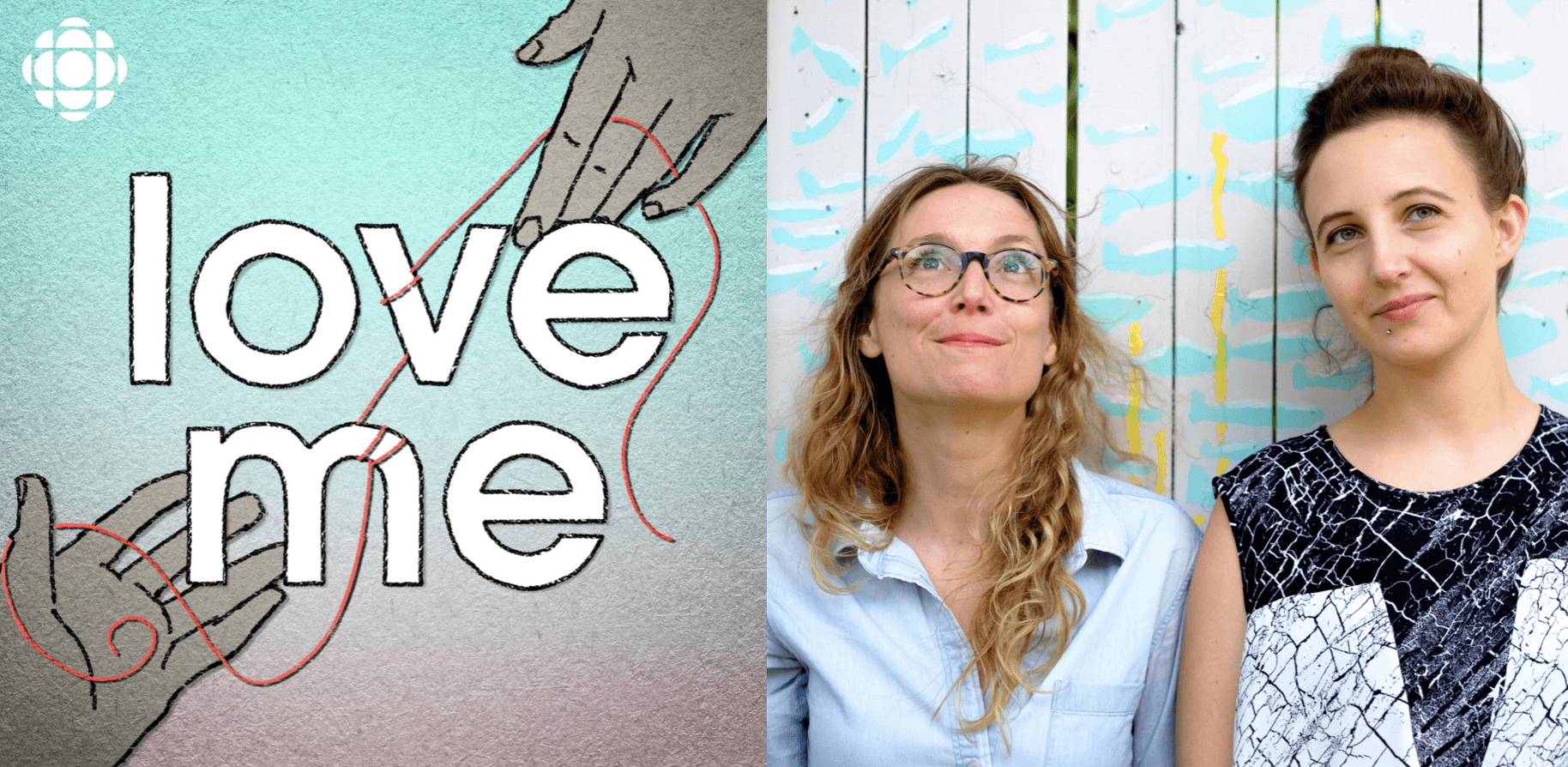Mira Burt-Wintonick and Cristal Duhaime have worked in radio for all of their adult lives. After graduating from Concordia University, in Montreal, they worked for over a decade on WireTap, the beloved (and dearly missed) CBC radio program hosted by Jonathan Goldstein. Now Burt-Wintonick and Duhaime are the producers behind CBC’s Love Me, a podcast “about the messiness of human connection.” The show, which is masterfully hosted by Lu Olkowski and has just completed its third season, makes good on this description. On each episode we hear deeply personal stories — about love, parenting, grief, any number of topics — anchored by lush and frequently experimental sound design. I spoke to the two producers to ask how the podcast came to be and to learn more about their process.
Where did the idea for Love Me come from?
Mira Burt-Wintonick: I’ve always been curious about the touchy subjects in people’s lives that they don’t really talk about, or areas where they’re struggling in their interpersonal relationships. We initially envisioned the show as a space for fiction, but since the second season we’ve left the fiction out. Still, we approach our non-fiction stories through the lens of fiction, using all the same tools. Our background working on WireTap definitely influenced the show in that we’re much more interested in experimenting with form. We wanted to make artful documentaries rather than reporting purely information-based stories.
How do you find your stories each week?
MBW: We get around 150 pitches a year, mostly from radio producers but also from people who just have an interesting story. The hardest part is then deciding which pitches will make for good radio. We hear a lot from people who are heartbroken, and while there might be a lot of emotional depth in their story, it’s often too relatable. Break-up stories are sad, yes, but what makes your special? We’re always trying to figure out which stories have something new that we haven’t explored already.
Want to receive our latest podcast reviews and episode recommendations via email? Sign up here for our weekly newsletter.
Many of your guests have little to no radio experience. How do you help them record their stories?
Cristal Duhaime: It’s different every time, but we always try our best to make our guests feel comfortable. Because most of our stories come from outside of Montreal, where we’re based, we often record them remotely. You might expect the distance to be a barrier to intimacy, but we’ve found it actually helps us. If our guests are in their own space, they can talk without the nerves that come with going into a formal studio to do an important interview.
That’s fascinating.
MBW: I think that’s something we learned on WireTap, as the show was based around having conversations over-the-phone. So it’s kind of a natural progression to what we’re doing now.
Can you tell me more about your production process?
CD: Well, after recording an initial interview and giving it a rough edit, we often realize we’re missing little bits here and there. So we’ll bring the guest back to fill in the blanks, and we push a little deeper into certain elements that were missing in the first recording. We also definitely go through a lot of editing and fine tuning. Our goal is to transport you into the speaker’s shoes, which is why it’s important that you really hear their voice. We’re trying to get you as close to that experience as possible, with the music and the pacing all working to enhance that intimacy.
What advice do you have for people hoping to work in radio?
MBW: I think people have to be doing it for the right reasons. If there’s a topic that you’re really interested in, that’s the radio you should make. People’s bullshit meters are pretty sensitive when it comes to audio. They can tell when you’re being insincere or doing something for the wrong reasons.
CD: I also think, no matter how saturated the market is, that what’s always needed is fresh ideas. Even if you’re a super talented, veteran producer, if you’re not thinking of new concepts, you’re going to start to run out of material. A good way to get your foot in the door, then, if you don’t have much experience, is having a really original idea. Pitch something that hasn’t already been done or experiment with a new way to tell a story. That allows you to work with producers who have more experience, and that’s the kind of win-win scenario where you learn a lot and an interesting piece gets made.
https://radiopublic.com/love-me-0G19lG/ep/s1!a858f
¤
Jack Conway is the editor of Podcast Review

